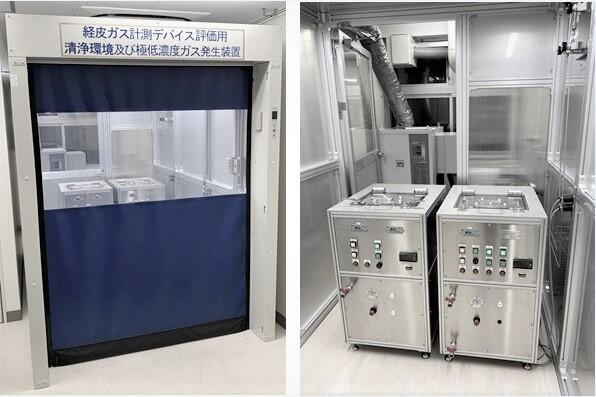The New Energy and Industrial Technology Development Organization (NEDO) is engaged in the development of gas measuring devices that measure, to an ultra-high degree of sensitivity, infinitesimal quantities of volatile components (from the blood) found in transcutaneous gases. In this project, Tokyo Medical and Dental University and the NMEMS Technology Research Organization (NMEMS TRA) have combined "ultra-low concentration gas generators" and "clean booths" to construct a clean environment in Tokyo Medical and Dental University where transcutaneous gas monitoring devices can be evaluated. The "clean environment for evaluation of transcutaneous gas monitoring device and ultra-low concentration gas generators," which were developed to set up this environment, create an extremely clean gaseous environment. This is the first equipment in the world for standard gas generation with highly accurate vapor pressure control that can evaluate devices that measure transcutaneous gas. Evaluations by gas measuring devices that are highly sensitive in terms of sensitivity, responsiveness, selectivity, etc., are possible, as is measuring infinitesimal quantities of transcutaneous gases released from the skin. In the future, researchers aim to develop an ultra-sensitive gas monitoring device that combines nano-integrated fluorometry and gaseous biosensing technologies, and small wearable measuring terminals with communication functions.

(Mitsubayashi Laboratory, Tokyo Medical and Dental University) Copyright © Tokyo Medical and Dental University. All Rights Reserved.
NEDO is moving forward with its "Development of Innovative Sensing Technology to Realize an IoT Society" project (from FY2019 to FY2023 at the latest), aiming to realize the future Society 5.0, which will ensure both early solutions to social issues and new value creation. This project is making use of Japan's strengths of cutting-edge materials technologies, nanotechnologies, and biotechnologies, to develop world-leading, innovative sensing devices that will be able to detect infinitesimal quantities of human volatiles, which is difficult to realize with current IoT technology, operate in extreme environments, and achieve contactless/non-destructive measuring. It is also focusing on the development of fundamental technologies that will improve the reliability of innovative sensing devices.
Meanwhile, in the healthcare field, many components clearly relating to metabolism and disease are found among the volatile organic compounds of human volatiles that are released from the human body, and researchers expect that these can be used as valid volatile biomarkers in disease screening tests.
Notably, human volatiles that come from the skin contain infinitesimal quantities of volatile organic compounds that originate in the blood, known as transcutaneous gases, and it is thought that if we can measure transcutaneous gas components with a high degree of sensitivity, we will be able to evaluate the component concentration in the blood without causing harm to the human body (non-invasive). However, equipment that can continuously sense the volatile components contained in human volatiles with an ultra-high sensitivity has not yet been developed.
Thus, NEDO, the Tokyo Medical and Dental University, and NMEMS TRA have focused on the development of a "skin volatile biosensor based on nano-integrated fluorometry (SNIF)" as one of the research and development themes of this project, and on this occasion have developed a "clean environment for transcutaneous gas monitoring device evaluation and ultra-low concentration gas generators," and constructed a clean environment where transcutaneous gas measuring devices can be evaluated, in Tokyo Medical and Dental University.
In this project, Tokyo Medical and Dental University and NMEMS TRA have combined "highly accurate low concentration gas generators" (made by GASTEC CORPORATION) and "clean booths" (made by Yamato Scientific Co., Ltd.) to develop a new "clean environment for transcutaneous gas measuring device evaluation and ultra-low concentration gas generators."
When it comes to the highly accurate generation of very-low-concentration gas in this equipment, the team have successfully achieved 60 ppt (volume ratio) acetone gas with an accuracy of ±5% via temperature adjustment accuracy of ±0.01°C or less, highly accurate control of carrier gas flow at 0.2-4 L/min, and vapor pressure control at low temperatures of 5°C or less.
Moreover, the design of the equipment means that it greatly reduces contamination caused by the mixing of chemical substances and atmospheric components by using electrolytically polished piping that suppresses absorption of carrier gases and gas components within the highly pure and high-pressure cylinder gas. Consequently, the use of this clean environment makes it possible to efficiently measure extremely small quantities of chemical components found in test subjects' transcutaneous gases with high accuracy.
This article has been translated by JST with permission from The Science News Ltd.(https://sci-news.co.jp/). Unauthorized reproduction of the article and photographs is prohibited.




